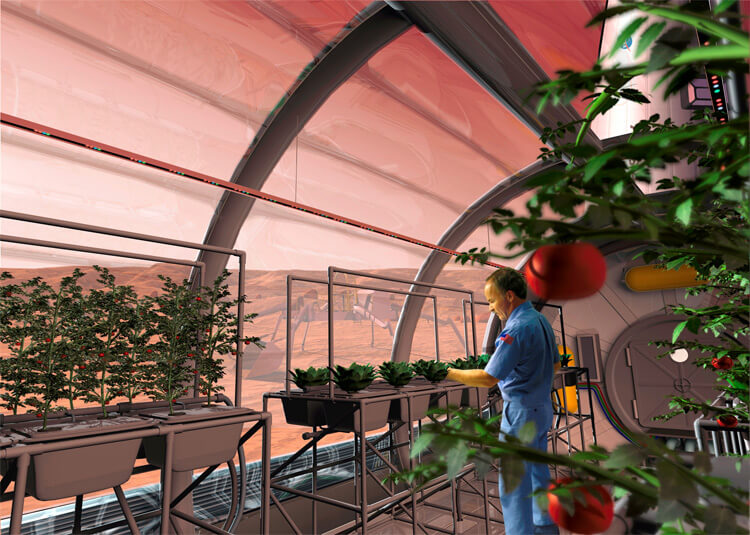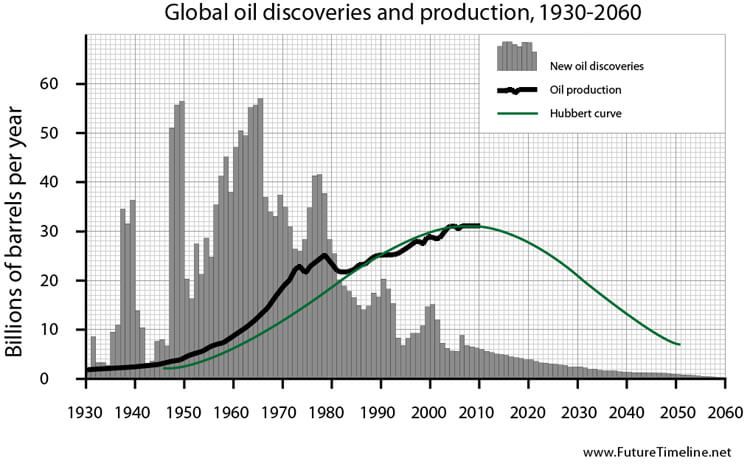
|
|
|
|
|
|
|
2059
The end of the oil age
For most of the 20th century, prospectors discovered far more oil than industrial societies could consume. This was an era of cheap and plentiful energy that saw huge growth in the world's economy and population. By 1970, however, a major slowdown in discoveries was observed. This continued into the 21st century and the industry now faced competition from renewables. By the late 2050s, the end of the 200-year oil age is being witnessed, as the final dregs of economically viable reserves are extracted.* Plastics and other oil-based products have been replaced by alternatives, such as bioplastics.
Mars has a permanent human presence by now
By the end of this decade, a permanent team of scientists is present on Mars.** This comprises a highly international mix of people. The first civilian tourist has also arrived. Travel to Mars is now cheaper and faster thanks to new forms of propulsion, cutting journey times from six months to just a few weeks.*
The base will soon be expanded with additional facilities providing more energy, food production and recycling systems, along with mining equipment and other tools.* Vehicles are being supplied too, improving the astronauts' mobility and enabling them to roam hundreds of miles. More sophisticated long term bases are now being planned to accomodate larger teams of scientists, as well as corporate interests.
The habitat modules are constructed partially underground, giving protection from the Sun's ultraviolet glare. Radiation-absorbing materials based on advanced nanotechnology are used in spacesuits, as well as on the exterior of the vehicles. These same materials have filters to block even the tiniest particles of dust, providing long term protection against the environment outside.
All of the above is providing the critical mass needed for self-sufficiency. Operations will soon be conducted entirely independent of Earth. In the coming years, the first children will be born on Mars.

Credit: NASA
« 2058 |
⇡ Back to top ⇡ |
2060 » |
If you enjoy our content, please consider sharing it:
References
1 "There could be less than 49 years of oil supplies left, even if
demand were to remain flat according to HSBC senior global economist
Karen Ward."
See Science: “Peak oil production may already be here”, Climate Progress:
http://climateprogress.org/2011/04/05/science-peak-oil-here/
Accessed 31st May 2011.
2 NASA Director Predicts Mars Settlement by 2060, Fora TV:
http://www.youtube.com/watch?v=5mRM9MlZ9bk
Accessed 24th March 2010.
3 "In the next generation or two—say the next 30 to 60 years—there will be an irreversible human migration to a permanent space colony. Some people will tell you that this new colony will be on the moon, or an asteroid—in my opinion asteroids are a great place to go, but mostly for mining. I think the location is likely to be Mars."
See The Coming Age of Space Colonization, The Atlantic:
http://www.theatlantic.com/technology/archive/2013/03/the-coming-age-of-space-colonization/273818/
Accessed 31st March 2013.
4 Ion engine could one day power 39-day trips to Mars, newscientist.com:
http://www.newscientist.com/article/dn17476-ion-engine-could-one-day-power-39day-trips-to-mars.html?DCMP=OTC-rss&nsref=online-news
Accessed 18th October 2009.
5 "Learning to grow plants on Mars will be an important precursor
to humans living there. Future explorers will need oxygen, food, and purified
water -- items too costly to ferry from Earth to Mars on a regular basis.
But plants can help provide those essentials inexpensively and locally
as part of a self-contained 'bioregenerative' life support system."
See NASA.gov:
http://science.nasa.gov/headlines/y2001/ast01jun_1.htm
Accessed 18th October 2009.
![[+]](https://www.futuretimeline.net/images/buttons/expand-symbol.gif)







